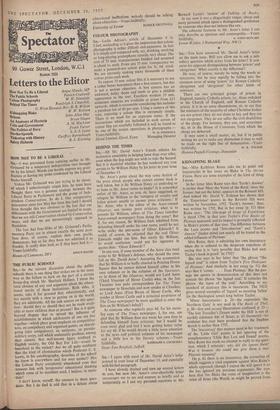SIR,—In the current discussion about the public schools there is
one thing that strikes me in the same way as the failure to ,bark on the part of a certain house-dog struck Mr. Sherlock Holmes. I mean the total absence of any real argument about the educa- tional merits of these institutions. Both sides, it seems, take it for granted that, educationally, and not merely with a view to getting on in the world, they are admirable. All the talk centres on this ques- tion : should they or should they not be made avail- able to more children than at present? But is it quite beyond dispute that to spread the influence of establishments in which adolescents pf one sex live together—which place great emphasis on competitive- ness, on compulsory and organised games, on church- going (also compulsory), on uniforms, on pseudo- military corps, and which undeniably produce, among their alumni, that well-known figure confined to English society, the Old Boy For Life—would be beneficial to the nation? Are we all quite confident that the kind of abomination which Professor C. S. Lewis, in his autobiography, describes of the school he knew is everywhere and for ever extinct? Has the Labour Party completely abandoned even that tenuous link with 'progressive' educational thinking which some of its members used, I believe, to main- tain?
I don't know, myself, the answers to these ques- tions. But I do find it odd that in a debate about educational institutions, nobody should be talking about education.—Yours faithfully,


































 Previous page
Previous page